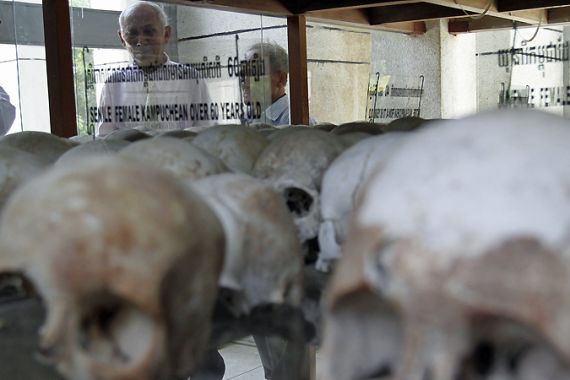Profiles: Khmer Rouge leaders on trial
Four top members of Cambodia’s Khmer Rouge are on trial on charges including crimes against humanity and genocide.

 |
| A quarter of Cambodia’s population was killed from 1975-1979 [EPA] |
Four of the most senior surviving members of the Khmer Rouge regime are facing justice for the first time, standing before a UN-backed tribunal in Cambodia’s capital, Phnom Penh.
They are accused of charges including crimes against humanity, genocide, homicide, torture and religious persecution.
Their trial comes three decades after their plans for a communist utopia in Cambodia left an estimated 1.7 million people dead by execution, medical neglect, overwork and starvation.
Only one other Khmer Rouge member has previously been tried: Kaing Guek Eav, known as Duch, was given a 35-year prison term in 2010, later commuted to 19 years.
Pol Pot, the leader of the Khmer Rouge, died in 1998 and was never brought to trial.
|
Nuon Chea, 84 |
The so-called Brother Number Two of the Khmer Rouge was the second in command to Pol Pot.
 |
| Nuon Chea was a key figure in founding the Khmer Rouge [EPA] |
He was one of the founding members of the Khmer Rouge and a senior figure from its days as a guerrilla force fighting the US-backed Lon Nol government, through its four years in power and until his final surrender to government forces in 1998.
Documentary evidence, including notes attached to several confessions from victims of the S-21 interrogation centre in Phnom Penh, have implicated Nuon Chea as a key player in devising and carrying out the Khmer Rouge’s mass execution policies.
He denies guilt and says he is not a “cruel” man but acted as a “patriot.”
Shortly after his surrender in 1998, as the last remnants of Khmer Rouge resistance broke down, Nuon Chea issued his first statement acknowledging the suffering inflicted on Cambodians during the Khmer Rouge rule.
“Actually we are very sorry, not just for the lives of people, but also for the lives of animals that suffered in the war,” he said.
|
Khieu Samphan, 79 |
Serving as the head of state, former president Khieu Samphan was one of the most powerful officials in the regime.
He was one of the key founders of the Cambodian communists who met as students in Paris in the 1950s.
He received a doctorate for his 1959 thesis on Cambodia’s economy, which strongly advocated self-reliance, one of the key tenets of Khmer Rouge ideology.
 |
| Khieu Samphan was a leading figure in the evolution of Khmer Rouge ideology [EPA] |
In 1985, six years after invading Vietnamese forces evicted the Khmer Rouge from power, he officially took over from Pol Pot as the group’s leader, a position he held until his surrender to the government in 1998.
At the time of his surrender he urged Cambodians to “let bygones be bygones”.
Several years later, in a series of interviews 2004, he said he was shocked to learn of Khmer Rouge crimes.
“I have found it so difficult to believe what people told me of what happened under the Khmer Rouge regime, but today I am very clear that there was genocide,” he told interviewers.
He said he was only a “shell” for the Khmer Rouge and had nothing to do with its radical policies.
He has denied responsibility for the atrocities he is accused of and blames Pol Pot for the group’s policies.
He was arrested in November 2007, days after being taken to hospital in the capital, Phnom Penh, reportedly following a stroke.
|
Ieng Sary, 85 |
Ieng Sary was deputy prime minister and foreign minister of Democratic Kampuchea, the name the Khmer Rouge gave Cambodia during its time in power.
He first met Pol Pot when the two men were students in Paris and fled with him to the jungles of eastern Cambodia following a crackdown on communists in the early 1960s.
 |
| Ieng Sary was the international face of the Khmer Rouge government [EPA] |
Ieng Sary and his wife were part of Pol Pot’s inner circle that made key decisions.
As foreign minister, Ieng Sary became the international face of the Khmer Rouge government. He allegedly persuaded diplomats and intellectuals based overseas to return to Cambodia. Most of the returnees were executed.
In 1977, in a speech to the United Nations General Assembly, he apparently sought to justify purges of officials saying that “enemies of all stripes” were looking to undermine and destroy Democratic Kampuchea.
In 1979 after the Khmer Rouge was ousted from power, he was sentenced to death in absentia by the Vietnamese-installed government.
In 1996, with the group’s forces in sharp decline, he defected with a large coterie of followers, setting the stage for the total collapse of the Khmer Rouge two years later.
His belated turn of heart earned him a limited amnesty from then-King Norodom Sihanouk, but one that officials have declared does not apply to the current UN-backed tribunal’s charges.
He disputes the charges levelled against him and has demanded his guilt be proven.
|
Ieng Thirith, 79 |
The wife of Ieng Sary was social affairs minister for the Khmer Rouge.
 |
| Former Social Affairs Minister Ieng Thirith was a sister-in-law of Pol Pot [EPA] |
Prosecutors say she participated in “planning, direction, co-ordination and ordering of widespread purges … and unlawful killing or murder of staff members from within the ministry of social affairs”.
She is the only woman of five senior Khmer Rouge figures to have been arrested and charged.
She has called the charges against her “100 per cent false.”
Her older sister, Khieu Ponnary, was Pol Pot’s wife.
Despite living in relative luxury in their post-Khmer Rouge days, she and her husband sought legal aid after being arrested in 2007, saying they had no money for a lawyer.